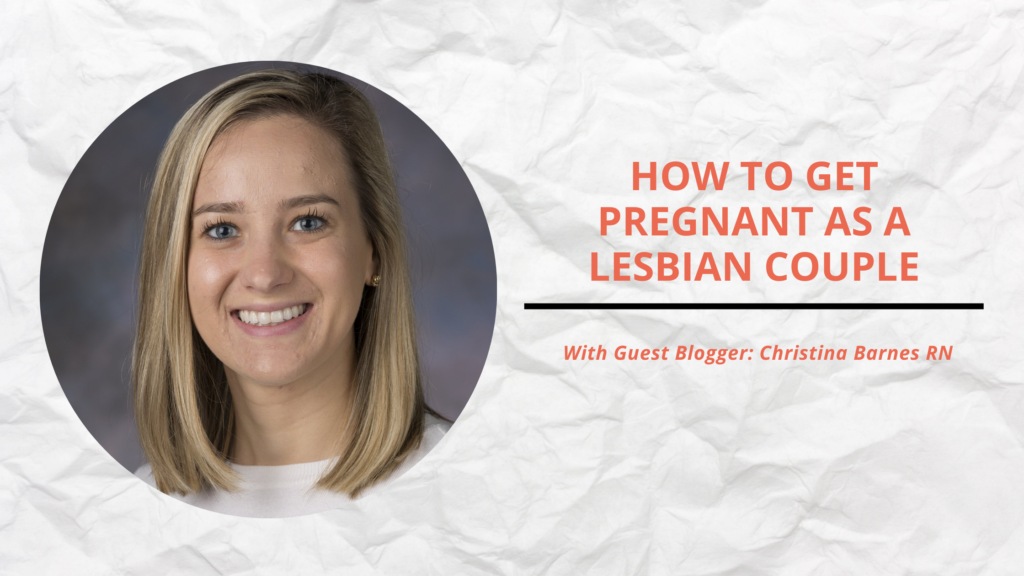How to Get Pregnant as a Lesbian Couple
In honor of Pride Month, Guest Blogger, Christina Barnes, RN, shares ways to get pregnant as a lesbian couple

Getting pregnant as a lesbian couple may seem complicated, but it all comes down to the three things you need to make a baby: sperm, an egg, and a uterus. You and your partner likely have the eggs and a uterus, but if not, you still have options (such as egg donation and surrogacy). In this post, though, we’re going to cover family creation for two women who have eggs and a uterus. If you have those two, you just need the sperm, which can be acquired through a known donor or a sperm bank. Once you’ve decided whose eggs, uterus, and sperm you’ll be using, you’re almost ready to go!
Before Trying To Conceive
Before one or both of you start trying to conceive, it is important to meet with your primary care doctor or gynecologist. Your doctor will make sure that you do not have any fertility issues and that you are healthy enough to successfully carry a pregnancy. If you do have any issues that might impact your fertility, it’s best to know that before purchasing vials of sperm or undergoing expensive procedures. You can discuss the different methods of family building and insemination with your doctor and decide which one is best for you and your partner.
This visit is also a great opportunity to discuss genetic testing. With genetic testing, you can find out if you are a carrier of a genetic disease. If you are a carrier of a particular disease, you can look for a donor who is not a carrier and reduce the risk that your child would inherit that disease.
There are many legal implications when same sex couples build their families, and it’s a good idea to understand your state’s laws about conception, pregnancy, birth, and parenting in same sex relationships. Connecting Rainbows is a free legal and fertility resource for the LGBTQ+ community to help start, grow, and protect your family. They can be found at www.connectingrainbows.org.

Intracervical Insemination (ICI)
Intracervical insemination (ICI) can be done at home, and is often referred to as home insemination. ICI is a relatively simple procedure – the woman being inseminated will lay in a comfortable place, and either she or her partner will insert the semen sample in a needless syringe into her vagina. The semen is injected into the area inside the vagina at the cervix. ICI is painless and less expensive than other options for family building, making it a great option for many couples. ICI is, however, less effective than IUI or IVF. Women with no fertility issues who undergo ICI have a 5-10% pregnancy success rate per cycle. One “cycle” is the period of ovulation when a person can get pregnant, regardless of how many times she inseminates with ICI during that period. When doing ICI, the woman must track her menstrual cycle and ovulation to pinpoint her exact fertile window. The ICI is then completed during the fertile window. Some women do ICI only once during the fertile window, and some do it multiple times per window. How often you do ICI during your fertile window is up to you.
Women who purchase donor sperm for ICI can use either ICI or IUI vials. ICI vials are less expensive than IUI vials, because the ICI vials still contain seminal fluid. In an IUI vial, that seminal fluid is washed away, also known as “pre-washed.” Your medical health provider will recommend which type of vial you should purchase.
Unfortunately, some states have laws that do not allow home insemination. These states may require that the insemination be performed by a physician. Fairfax Cryobank’s client services can help you determine your state’s laws: 800-338-8407.
For more information on ICI and home insemination, check out some stories from families who chose to create their families through ICI:
The Ensign Family: https://fairfaxcryobank.com/blog/how-we-got-pregnant-fast-as-a-lesbian-couple-abbie-and-julia-ensign
The Anderson Family: https://fairfaxcryobank.com/home-insemination
Intrauterine Insemination (IUI)
Intrauterine insemination (IUI) is done in a doctor’s office or clinic, and usually takes about 15-20 minutes to complete. A long, flexible tube is inserted through the woman’s cervix directly into the uterus. Sperm is injected through this tube into the uterus, where it has a higher chance of meeting and fertilizing an egg. IUI has a higher pregnancy success rate than ICI – a woman has a 15-20% success rate per cycle of IUI. When comparing ICI versus IUI, IUI may be a better choice for women who are unable to track their cycles with home ovulation predictor kits, as well as women with a history of fertility issues.
While IUI is more effective than ICI, one downside is that it is more expensive. The cost of IUI includes any doctor’s office and procedure fees, any testing or ultrasounds, medications, and the IUI pre-washed sperm sample. It may be possible to purchase an ICI sperm sample if your clinic can pre-wash it for you, but make sure to check with your healthcare provider first.
Check out some of our Fairfax Cryobank families who chose to have their babies through IUI:
The Conrad Family: https://fairfaxcryobank.com/blog/two-moms-and-a-vial-of-sperm
The Mitryk Family: https://fairfaxcryobank.com/blog/fairfax-family-testimonial-krystian-mitryk
In Vitro Fertilization (IVF)
In Vitro Fertilization (IVF) has the highest pregnancy success rate of all available reproductive options, but it is also the most expensive and invasive. IVF involves retrieving eggs from one or both partners, fertilizing them with sperm outside of the body, and then implantation of the fertilized embryos into one or both partners.
IVF can offer lesbian couples unique ways to create their families, allowing couples to choose whose eggs they use, who will carry the baby (or babies), and when the embryos will be implanted. Some couples who use IVF choose to implant embryos together and become pregnant at the same time, some choose to have one woman carry a baby first and the other woman carry a baby from the same embryo batch a few years later. Some couples choose to do reciprocal IVF, where one woman’s eggs are retrieved and fertilized, and then implanted into her partner’s uterus. The baby is carried and birthed by the non-genetic mother, allowing each woman to contribute significantly to the creation and growth of their baby.
For some personal stories from lesiban couples who have undergone IVF and reciprocal IVF, check out these posts:
The Lotito Family (IVF): https://fairfaxcryobank.com/blog/donor-sperm/fairfax-families-meet-the-lotito-family
The Jaffe Family (Reciprocal IVF): https://fairfaxcryobank.com/blog/the-jaffes-journey-to-motherhood-with-rivf








… [Trackback]
[…] Find More on that Topic: fairfaxcryobank.com/blog/lgbtq/how-to-get-pregnant-as-a-lesbian-couple […]
… [Trackback]
[…] Information on that Topic: fairfaxcryobank.com/blog/lgbtq/how-to-get-pregnant-as-a-lesbian-couple […]
… [Trackback]
[…] Info on that Topic: fairfaxcryobank.com/blog/lgbtq/how-to-get-pregnant-as-a-lesbian-couple […]
… [Trackback]
[…] There you will find 32620 more Info on that Topic: fairfaxcryobank.com/blog/lgbtq/how-to-get-pregnant-as-a-lesbian-couple […]
… [Trackback]
[…] Information on that Topic: fairfaxcryobank.com/blog/lgbtq/how-to-get-pregnant-as-a-lesbian-couple […]
… [Trackback]
[…] Here you will find 43647 additional Info to that Topic: fairfaxcryobank.com/blog/lgbtq/how-to-get-pregnant-as-a-lesbian-couple […]
… [Trackback]
[…] Info to that Topic: fairfaxcryobank.com/blog/lgbtq/how-to-get-pregnant-as-a-lesbian-couple […]
… [Trackback]
[…] Read More to that Topic: fairfaxcryobank.com/blog/lgbtq/how-to-get-pregnant-as-a-lesbian-couple […]
… [Trackback]
[…] Find More Information here to that Topic: fairfaxcryobank.com/blog/lgbtq/how-to-get-pregnant-as-a-lesbian-couple […]
… [Trackback]
[…] Here you will find 49888 more Information to that Topic: fairfaxcryobank.com/blog/lgbtq/how-to-get-pregnant-as-a-lesbian-couple […]
… [Trackback]
[…] There you will find 87923 more Info on that Topic: fairfaxcryobank.com/blog/lgbtq/how-to-get-pregnant-as-a-lesbian-couple […]
… [Trackback]
[…] Information to that Topic: fairfaxcryobank.com/blog/lgbtq/how-to-get-pregnant-as-a-lesbian-couple […]
… [Trackback]
[…] Read More Info here on that Topic: fairfaxcryobank.com/blog/lgbtq/how-to-get-pregnant-as-a-lesbian-couple […]
… [Trackback]
[…] Find More here on that Topic: fairfaxcryobank.com/blog/lgbtq/how-to-get-pregnant-as-a-lesbian-couple […]
… [Trackback]
[…] Find More here to that Topic: fairfaxcryobank.com/blog/lgbtq/how-to-get-pregnant-as-a-lesbian-couple […]
… [Trackback]
[…] Find More on that Topic: fairfaxcryobank.com/blog/lgbtq/how-to-get-pregnant-as-a-lesbian-couple […]
… [Trackback]
[…] Read More on on that Topic: fairfaxcryobank.com/blog/lgbtq/how-to-get-pregnant-as-a-lesbian-couple […]
… [Trackback]
[…] Information to that Topic: fairfaxcryobank.com/blog/lgbtq/how-to-get-pregnant-as-a-lesbian-couple […]
… [Trackback]
[…] Here you can find 35368 additional Information to that Topic: fairfaxcryobank.com/blog/lgbtq/how-to-get-pregnant-as-a-lesbian-couple […]
… [Trackback]
[…] Information on that Topic: fairfaxcryobank.com/blog/lgbtq/how-to-get-pregnant-as-a-lesbian-couple […]
… [Trackback]
[…] There you can find 14049 more Information to that Topic: fairfaxcryobank.com/blog/lgbtq/how-to-get-pregnant-as-a-lesbian-couple […]
… [Trackback]
[…] Read More on that Topic: fairfaxcryobank.com/blog/lgbtq/how-to-get-pregnant-as-a-lesbian-couple […]
… [Trackback]
[…] Find More on to that Topic: fairfaxcryobank.com/blog/lgbtq/how-to-get-pregnant-as-a-lesbian-couple […]
… [Trackback]
[…] Find More to that Topic: fairfaxcryobank.com/blog/lgbtq/how-to-get-pregnant-as-a-lesbian-couple […]
… [Trackback]
[…] Read More Information here to that Topic: fairfaxcryobank.com/blog/lgbtq/how-to-get-pregnant-as-a-lesbian-couple […]
… [Trackback]
[…] Here you will find 6364 more Info on that Topic: fairfaxcryobank.com/blog/lgbtq/how-to-get-pregnant-as-a-lesbian-couple […]
… [Trackback]
[…] Find More Information here to that Topic: fairfaxcryobank.com/blog/lgbtq/how-to-get-pregnant-as-a-lesbian-couple […]